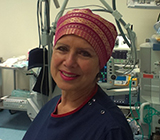 After 35 years working as a theatre scrub nurse, I permit myself a day off once in a while. So I was cycling through the park, on my way to the tennis court, when my phone rang. An anaesthetist I used to work with asked me if I would care to join a plastic surgery team on a mission to Bangladesh. My answer was an immediate: “Yes!”
After 35 years working as a theatre scrub nurse, I permit myself a day off once in a while. So I was cycling through the park, on my way to the tennis court, when my phone rang. An anaesthetist I used to work with asked me if I would care to join a plastic surgery team on a mission to Bangladesh. My answer was an immediate: “Yes!”
Fast forward two months and after a two hour drive to the south of Dhaka, we arrive at a small hospital. It is part of the Doctors of the World supported “Operation Sourire,” which sends dedicated surgeons from Europe—many of whom give up their annual leave to volunteer on missions—to ensure children born with facial disfigurements such as cleft lips and cleft palates get safe and effective reconstructive surgery.
An enormous amount of people are already waiting in the corridor, yelling, and calling out loud. They are afraid they will not get their turn.
To make some space around the screening tables we have to move people behind a fence. Some have extreme facial deformities. We screen babies and young adults with cleft lips and palates and a lot of patients with contractures due to burns. Many people in Bangladesh (mainly women) have acid thrown over them, often by current or ex-partners.
The operating room itself is very small and contains two tables. We all start to feel sleepy and we discover there’s no way to get rid of the anaesthetic gasses other than to make a hole in the window. So we do. The cows, just outside, are licking the bars with their tongue and flies start coming into the room. We try to operate in the most sterile environment possible, but you have to adjust to the circumstances you are in.
Every now and then there is a power cut and the suction stops working. When you are operating on a palate, you hope it will not be for long. The surgeons continue to operate with portable headlights on.
Unfortunately we once had to amputate a finger. I wanted to throw it away, but the patient wanted to take it with her to bury it. Each day we learn more about this country’s people.
One morning we discover there has been a fire inside the steriliser! There is a thick layer of soot on all the surgical instruments. We clean them by hand, piece by piece, and although it takes the shine off, we can still use them. So in the following days we use the pan to boil water, it is very small and old and full of limescale. But the main thing is: we can continue operating.
A “few years” of experience, in several hospitals around the world, makes this team very flexible and creative so we see these “incidents” as challenges. On our last day we give Doctors of the World certificates to all of the local staff, which they are very happy with.
A year later we went to the same hospital and saw great progress from the local staff. We surprised them with a new and bigger pan to boil water bought with money from our choir’s fundraising event. Next time we will buy a fridge for the hospital to prevent the ice cubes from melting before they are put on the patient’s lips. There is so much more we can do.
Albertine Schmull is a theatre scrub nurse from the Netherlands who volunteers for Doctors of the World projects around the world that ensure children born with as cleft lips and cleft palates get reconstructive surgery.
The BMJ has chosen Doctors of the World for this year’s Christmas charity appeal. Please support the appeal by donating:
Online at: www.doctorsoftheworld.org.uk/BMJ
By text message: text DOCTOR to 70030 (for UK mobile networks only. £10 donation)*
By phone: 02035357955
By cheque: please make cheque’s payable to Doctors of the World UK and send to: BMJ Appeal, Doctors of the World UK, One Canada Square, London, E14 5AA.
*You will be charged £10, plus one message at your standard network rate. A minimum of £9.94 depending on your service provider, will be received by Doctors of the World UK, Registered Charity No: 1067406. If you have any questions please call 020 7167 5789.
